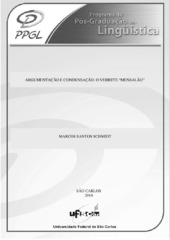Argumentação e condensação: o verbete "mensalão"
Resumo
Mensalão ( big monthly payment a fee out of the law which was paid for some politicians in Brazil): what is the functional argument for this meaning? How had have this expression brought about history, memory and meaning? Motivated by something that mobilized politics and the Brazilian media, we tried to answer this question from a linguistic position which is connected to the Semantics of an Event (GUIMARÃES, 2002), specially about the relation between the theory and the events foretell, a place that brings sense in the language. Thus, the meaning of a designation is prohibited inside the event and in the period of nowadays; on the other hand it mobilizes the originality of the language. The factual, as is presented by Gadet e Pêcheux (2004), on the other hand, induces the fault, the misunderstanding and the misinterpretation which the subjects cannot control; the functional of the language makes to understand the words and the meanings, but they are tensioned by a dispute inside the place they are originated. Therefore, for this work, we picked out sequences of headlines and reports from O Estado de São Paulo Brazilian newspaper, between 22th and 27th August, 2007, which was the period when the mensalão practices were being judged in STF (Brazilian Higher Federal Court), with the main objective is to show how this media identified the neologism between rows and rows. This study will use for the analysis the concepts of argumentation from Ducrot (1973), to whom the language does not inform, but shows the arguments that make us to produce specific conclusions, and of abstract, according to Guimarães (2004, 2005, 2007), in its semantic domain determination.
